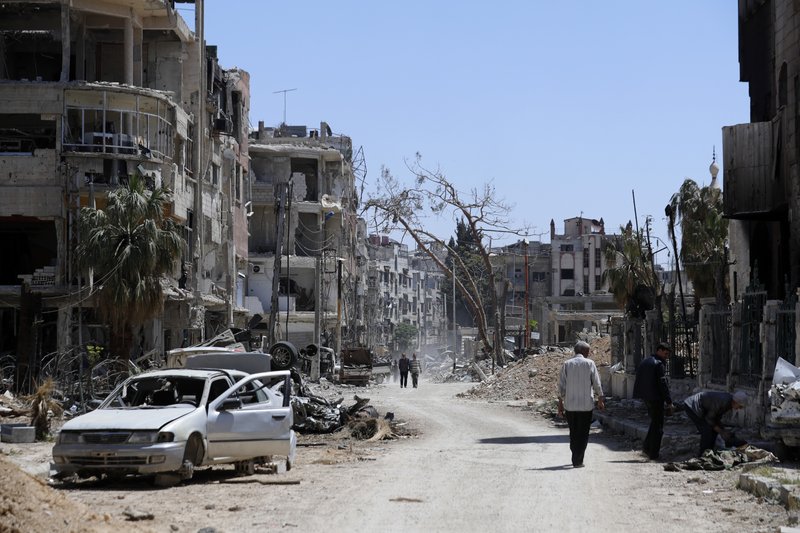BEIRUT (AP) — The Latest on developments in Syria (all times local):
Syria’s state news agency says inspectors from the Organization for the Prohibition of Chemical Weapons have reached the town of Douma to investigate reports of a suspected April 7 gas attack.
The inspectors entered Douma on Tuesday after arriving in Syria on Saturday.
The United States, Britain, and France say the Syrian government was behind the attack, and launched a wave of missiles targeting Syrian military installations on Saturday as punishment.
Syria and its ally Russia deny any chemical attack took place, and Russian officials have gone even further, accusing Britain of staging a “fake” chemical attack.
Douma was the last town held by rebels in the eastern Ghouta region outside Damascus, until they surrendered the day after the alleged gas attack.
The Kremlin says Russian President Vladimir Putin has told German Chancellor Angela Merkel that the United States, Great Britain and France have violated international law and hurt peace process in Syria by launching airstrikes at targets in Damascus.
Russia has condemned the allied strikes on Sunday but refrained from responding to the attack on its ally, Syrian President Bashar Assad.
The Kremlin said on Tuesday in a read-out of the phone call between Putin and Merkel that the prospect for peace talks for Syria were damaged by the airstrikes, which were carried out in retaliation for the reported poison gas attack on a rebel-controlled suburb of Damascus.
A fact-finding mission from the Organization for the Prohibition of Chemical Weapons is due to visit the site of the suspected gas attack. The Kremlin said on Tuesday both Putin and Merkel support the OPCW mission and hope for a thorough probe.
French President Emmanuel Macron has vigorously defended his decision to launch airstrikes on Syria, responding to criticism on the joint operation by France, Britain and the United States.
He spoke at the European parliament on Tuesday, showing signs of anger and sometimes almost shouting.
Macron cited all those “who are outraged each time by images we’ve seen of children, women who died of a chlorine attack.”
He asked: “Do we sit back, do we defend (human) rights by saying: rights are for us, principles are for us, and realities are for other? No, no!”
He says the U.S., France and Britain intervened in a “legitimate, multilateral framework” and stressed airstrikes specifically targeted three chemical weapon facilities “without any human life loss.”
Some European lawmakers expressed criticism at France’s action in Syria, raising placards reading “Stop the war in Syria” and “Hands off Syria” during Macron’s speech.
Syria’s state run television says a false alarm — and not an outside aggression and incoming airstrikes — had set off Syrian air defenses early this morning.
The TV quotes an unnamed military official as saying on Tuesday that air defenses fired a number of missiles because of a false alarm, without providing more information.
Hours earlier, Syrian government-run media said the country’s air defenses confronted a new “aggression,” shooting down missiles over the central region of Homs and a suburb of Damascus.
The reports did not say who carried out the pre-dawn strikes, which were reported by Syrian state TV and the government-run Syrian Central Media.
The reports came just a few days after the United States, Britain and France conducted airstrikes targeting alleged chemical weapons facilities in Syria, in retaliation for a suspected poisonous gas attack.
The Group of Seven leading industrialized nations has issued a joint statement endorsing the U.S.-led air strikes in Syria.
The leaders of Canada, France, Germany, Italy, Japan, Britain, the United States and European Union said in a joint statement early Tuesday that they condemn the April 7 chemical attack in eastern Ghouta in Syria.
The G-7 say they “fully support all efforts made by the United States, the United Kingdom and France to degrade the (Bashar) Assad regime’s ability to use chemical weapons and to deter any future use” with the strikes.
The say the airstrikes last Saturday by the three nations were “limited, proportionate and necessary” and followed “only after exhausting every possible diplomatic option to uphold the international norm against the use of chemical weapons.”
The G-7 members say they “remain committed to a diplomatic solution to the conflict in Syria.”
Syrian state-run television has reported that the country’s defenses have confronted a new “aggression,” shooting down missiles over the central Homs region.
It didn’t say who carried out the early Tuesday airstrikes. The Syrian Central Media said the missiles targeted Shayrat air base in Homs. Another strike earlier this month in Homs was blamed on Israel.
The report comes a few days after the U.S., Britain and France conducted airstrikes targeting alleged chemical weapons facilities in Syria, in retaliation for a suspected chemical weapons attack that they blamed on the Syrian government.
Experts from the international chemical weapons watchdog are in Syria and are now expected to visit that site in the town of Douma Wednesday. That’s after Syrian and Russian authorities prevented them from going to the scene Monday.
AP

